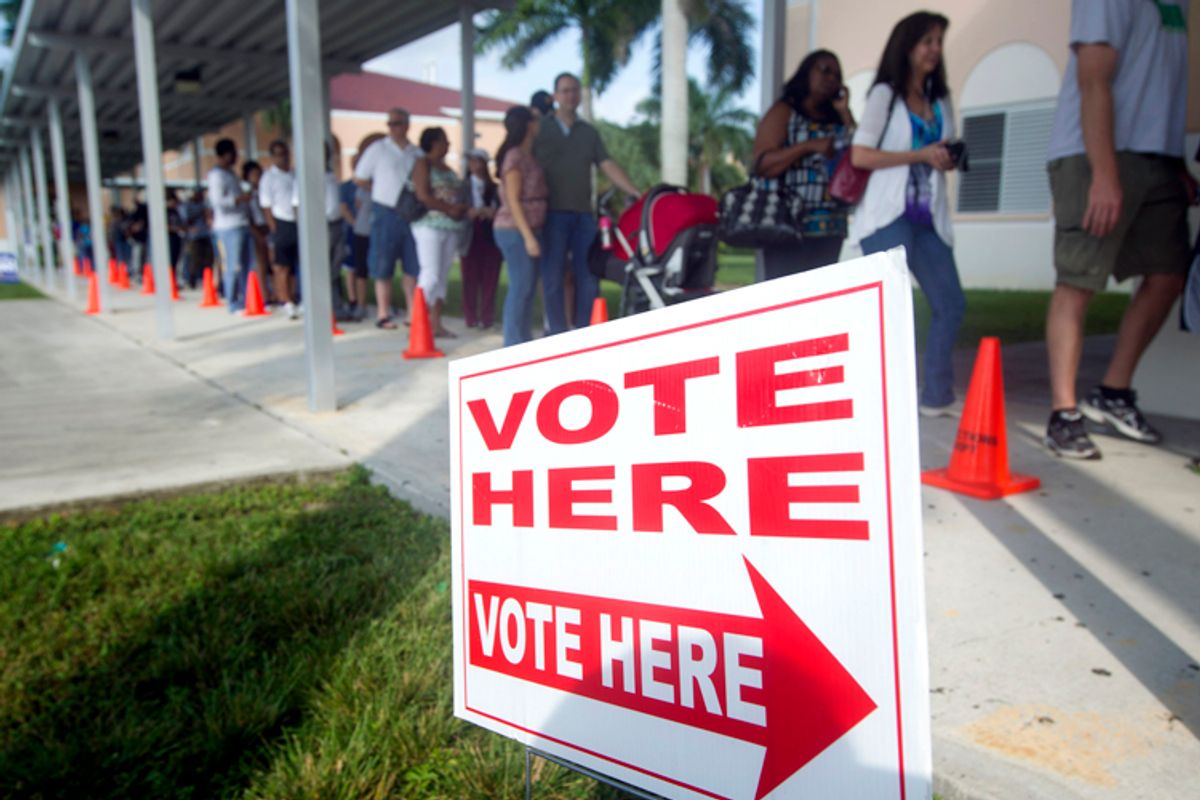The Presidential Commission on Election Administration has released its report and recommendations, and reasonable people everywhere rejoice. The bipartisan commission was formed by Barack Obama following the 2012 election, which was a bit of an embarrassment for a nation that considers itself something of a model democracy. Across the country (but mainly in urban areas and black and Latino neighborhoods), Election Day featured hours-long lines, broken voting machines, inaccurate voter rolls and confusing ballots.
"The Editors" of Bloomberg View declare the report "so resolutely practical that it’s hard to imagine its recommendations stirring much debate, much less controversy." (They acknowledge that "not all politicians want to make it easier for Americans to vote," but they fail to specify that that's more or less part of the Republican Party platform.) Jeffrey Toobin calls it "an unexpectedly bold document."
The commission's key recommendations are eminently reasonable: Expand online voter registration, expand early voting, improve and modernize voting machines, and improve efficiency and alleviate wait times at polling places with better training and techniques that have been proven to work elsewhere. Everyone should be able to support all of this, and, best of all, the commission's recommendations don't require any federal action at all. They just need to be voluntarily implemented by state and local officials. And how hard could it be to convince state and local officials to make voting easier?
Here's the first problem with the commission's report: We already know what's wrong with American elections and we already know how we should fix those problems. The last bipartisan commission on American elections released its report and recommendations less than a decade ago. That report followed up a major piece of federal election reform, the Help America Vote Act, which was the bipartisan response to the travesty that was the 2000 election. The Help America Vote Act created another bipartisan commission dedicated to making voting easier, the U.S. Election Assistance Commission. That commission is supposed to have two commissioners from each party. Republicans in Congress have effectively killed that commission by refusing to appoint or approve any commissioners at all.
Despite that obstruction, the problems with American elections, and potential solutions, were already well-known to voting rights experts. The No. 1 culprit is our absurdly decentralized system, which makes implementing good ballot and registration and access and voting machine standards effectively impossible. But we knew that making registration easier and allowing early voting and voting by mail would improve turnout and make voting easier for the elderly and disabled. We knew urban election districts were at a disadvantage due to population size and density, and insufficient funding. We knew ballot size and clarity was lousy all over the country because of archaic or poorly written laws. The problem has always been finding the resources and political will to fix any of this. Because unless we nationalize voter registration and federal elections, the fixes will have to come not just in 50 separate state legislatures but also at thousands of city halls and county governments.
Which brings us to the second, bigger problem with the report: The commission was tasked with making it easier for Americans to vote. One of the two dominant American political parties is adamantly opposed to that goal. Despite the bipartisan trappings of the commission, despite the fact that Mitt Romney's campaign lawyer was the co-chair, it is still the case that making it easier to vote is a priority of the Democratic Party. The more honest right-wingers make the argument explicit, but implicit in every voter ID law and attempt to shut down voter registration drives and restriction of early voting is the core conservative belief that voting should be as hard as possible, so that only the right people vote. It is only occasionally said out loud but most conservatives believe in the old saw, usually incorrectly attributed to de Tocqueville or a founding father, about democracy dying when the looters begin to "vote themselves largess from the public treasury." Throughout American history, conservatives have opposed extending the franchise.
In addition to their philosophical opposition to democracy, Republicans have a more pragmatic reason to making voting as difficult as possible: Recent national election results show an unmistakable correlation between turnout and Democratic Party success. As Dave Weigel points out, some of the commission's recommendations will make it easier for traditionally Republican blocs like religious voters (and military voters! and the elderly!) to vote, but Republicans believe, with plenty of supporting evidence, that in America in 2014, bigger turnout means more Democratic voters. A bipartisan commission won't convince Republicans to abandon their campaign to use every tool at their disposal to depress the vote.

Shares